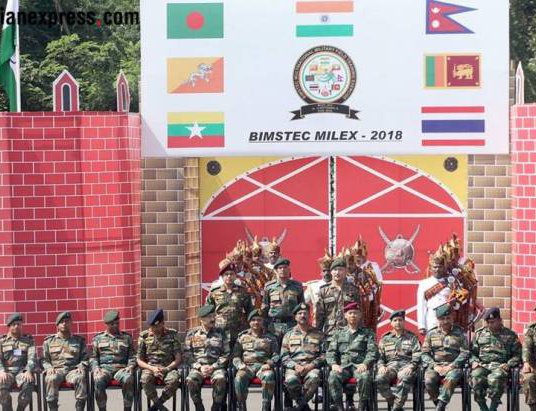
Just days after backing out from the week-long military exercise of Bay of Bengal Initiative for Multi-Sectoral Technical and Economic Cooperation (BIMSTEC) countries in India, Nepal has reportedly decided to take part in a 12-day long military exercise with China.
Nepal Army spokesperson Brig Gen Gokul Bhandaree told The Times of India that the joint exercise with China (Sagarmatha Friendship-2) will take place from 17-28 September in Chengdu and the main focus of the exercise would be counter-terror operations.
File image of Prime Minister Narendra Modi with his Nepalese counterpart KP Sharma Oli. India has expressed its displeasure with Nepal over its decision to not join the BIMSTEC exercise and has told Kathmandu that its decision is not appropriate. According to Hindustan Times, New Delhi has informed Kathmandu that its explanation of internal political pressure is "not convincing".
The Nepal government reportedly made the decision after strong criticism from different quarters, including influential leaders from the ruling Nepal Communist Party.
The timing of the two decisions is significant because they come at a time when Nepal has finalized the Transit and Transportation Agreement with China, which will allow Kathmandu vital access to Beijing's sea and land ports.
The agreement said that China had also agreed to allow Nepal use its dry (land) ports at Lanzhou, Lhasa and Xigatse as well as roads to these facilities. Commerce ministry official Rabi Shankar Sainju said that Nepali cargo from Japan, South Korea and other north Asian countries could be routed through China which would cut shipping time and costs.
Overland trade is now routed mainly through the east Indian port of Kolkata which takes up to three months, officials said. The Himalayan nation, according to Reuters, seeks to end India’s monopoly over its trading routes by increasing connections with Beijing. At present, it depends heavily on India for the supply of essential goods including fuel and the use of its ports for trade with other countries.
Kathmandu has sought access to Chinese ports to reduce dependence on India since a prolonged blockade of its border crossings with India in 2015 and 2016 left the country short of fuel and medicine for several months. This is not surprising considering Nepal's prime minister KP Sharma Oli is largely known for his 'pro-China' stance.
In 2016, when the CPN (Maoist Centre) had pulled their support from Oli's government, he had blamed India. "India's role was primarily behind" the pulling out of support by the Maoists, Oli had said, adding that the process of government change was "not an automatic process but conducted by remote control".
However, after assuming charge again in 2018, he chose India for his first foreign trip indicating that he wanted to heal the frayed ties. Ahead of the visit, Oli had categorically said that he wants to deepen ties with China to get more leverage in his dealings with India "in keeping with the times." He also favored a review of India-Nepal ties including the long-established practice of Nepalese soldiers serving India's armed forces. "We don't want to depend on one country or have one option," he had said.
Soon after, he made the three-day visit to India and in his joint statement with Prime Minister Narendra Modi, he had said his mission is to take India-Nepal ties to "newer heights" and that his country always accorded "great importance" to its ties with India as the two neighbors have many "things to offer each other".
Calling the trip "significant and fruitful", he said it helped clear misunderstandings and mistrust between the two nations. Both the nations have time and again reiterated that all the mistrust between them is now over. During his visit to Nepal in May this year, Modi termed the India-Nepal ties "like a family".
Despite the 'successful' talks with Modi and India-Nepal relations reaching 'newer heights', Oli has largely remained pro-China. After India, his immediate next visit was to China, where he signed eight agreements for developing major infrastructure projects in the land-locked Himalayan nation.
China is also making fast inroads into Nepal with aid and development. The two countries are also in talks for building a railway link into Nepal, constructing an electric transmission line and are conducting a feasibility study for a free trade agreement. Nepal's foreign policy under Oli has become more complicated than ever with Kathmandu wanting a "cordial" relationship with both China and India.
As First post noted earlier,Nepal's complicated balance of India and China must be seen as the new normal for the bilateral relationship and New Delhi must take note of the fact that if Kathmandu sees Beijing offering a better deal, it's likely to take that one.
Newspapers
News lifted from various daily and weekly newspapers
- Home Minister Thapa And Defense Minister Pokharel In Quarantine
- Aug 29, 2020
- Nepal’s Department Of Archeology To Conduct A Study On Birthplace of Lord Rama In Nepal
- Jul 16, 2020
- Dr Anthony Fauci Calls White House Attacks 'Bizarre'
- Jul 16, 2020
- Africa’s Water War On Nile River
- Jul 16, 2020
- 11 Die In Tanahun Due To Landslides And Floods
- Jul 13, 2020
















